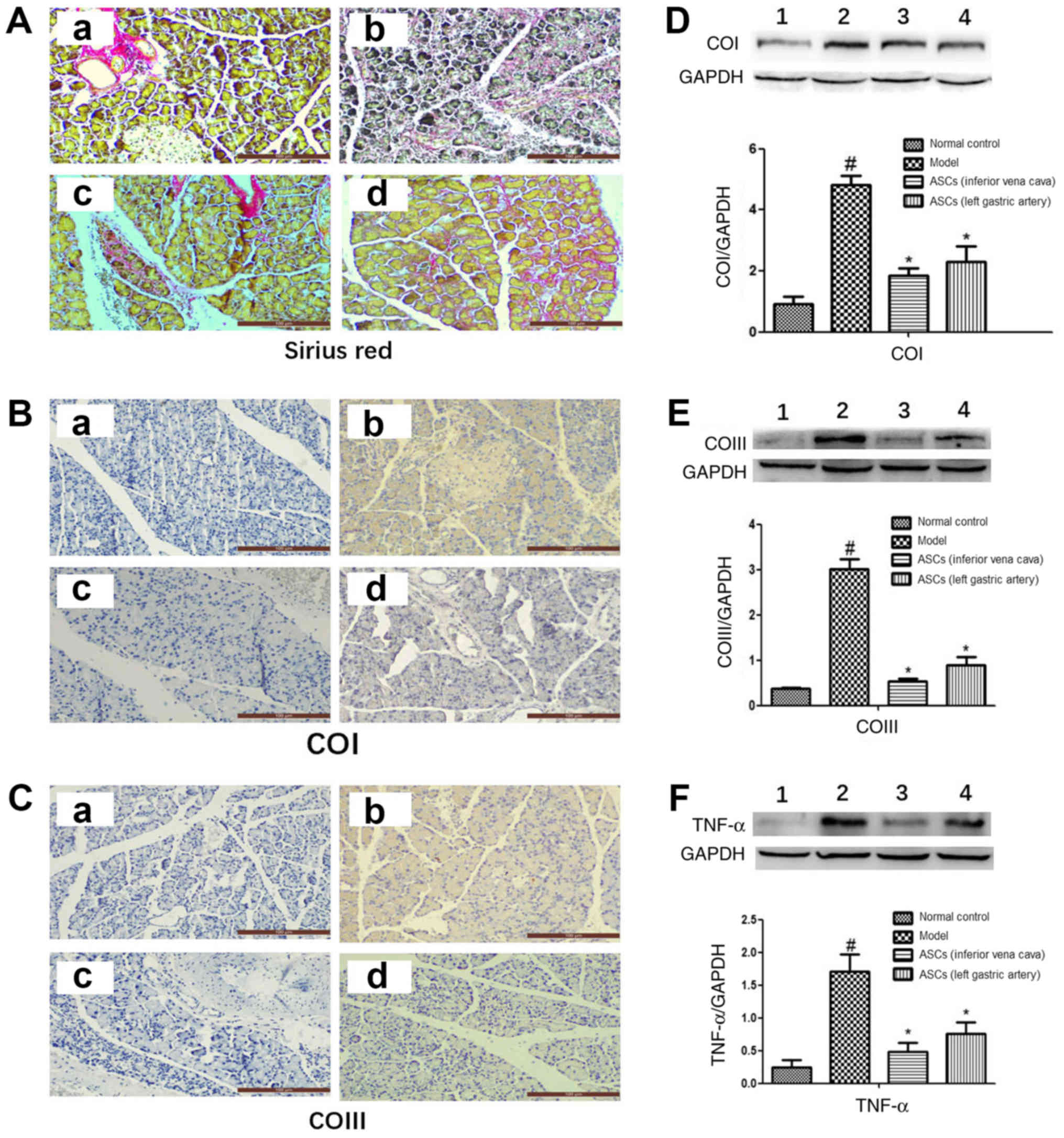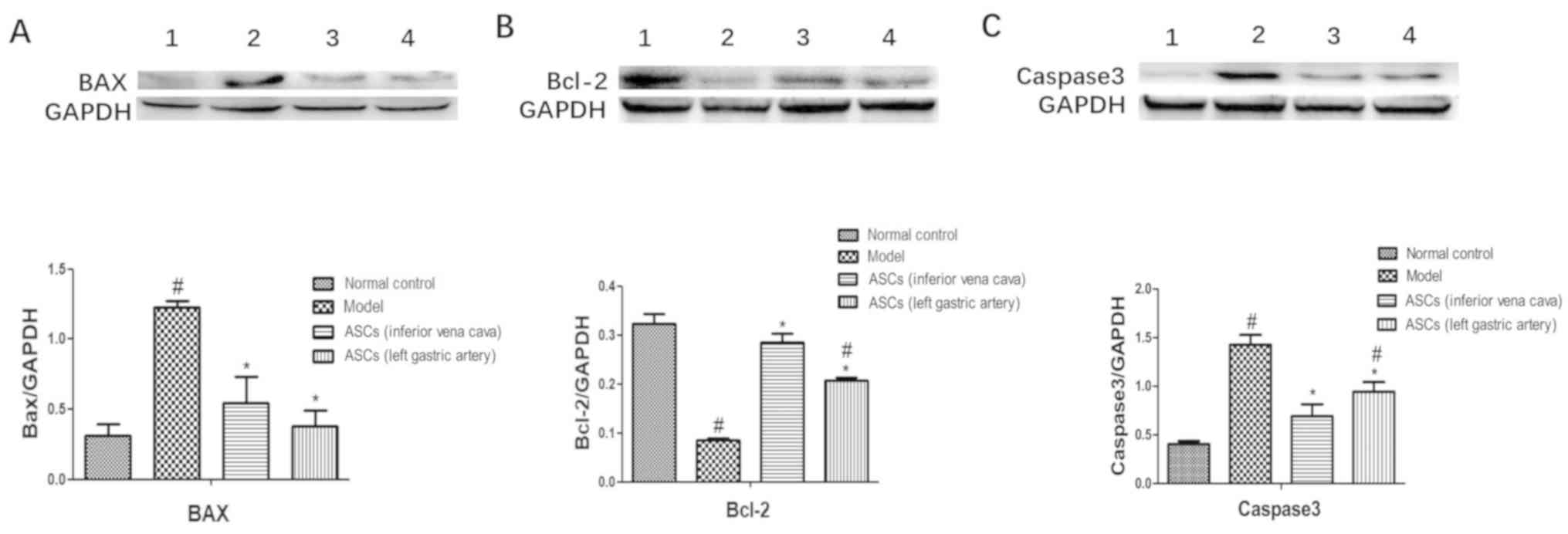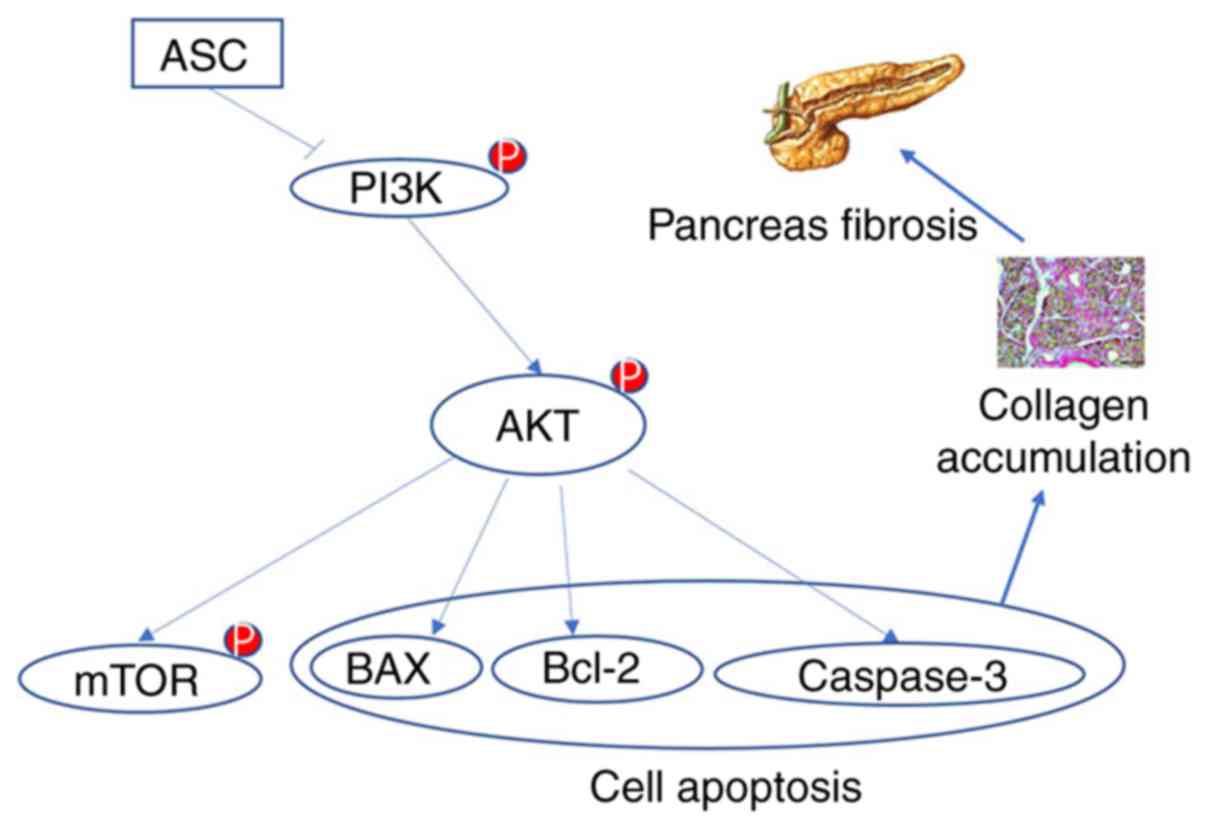|
1
|
Yadav D, Timmons L, Benson JT, Dierkhising
RA and Chari ST: Incidence, prevalence, and survival of chronic
pancreatitis: A population-based study. Am J Gastroenterol.
106:2192–2199. 2011. View Article : Google Scholar : PubMed/NCBI
|
|
2
|
Lankisch PG: Natural course of chronic
pancreatitis. Pancreatology. 1:3–14. 2001. View Article : Google Scholar : PubMed/NCBI
|
|
3
|
DiMagno MJ and Dimagno EP: Chronic
pancreatitis. Curr Opin Gastroenterol. 22:487–497. 2006.PubMed/NCBI
|
|
4
|
Andrén-Sandberg A, Hoem D and Gislason H:
Pain management in chronic pancreatitis. Eur J Gastroenterol
Hepatol. 14:957–970. 2002. View Article : Google Scholar : PubMed/NCBI
|
|
5
|
Argo JL, Contreras JL, Wesley MM and
Christein JD: Pancreatic resection with islet cell autotransplant
for the treatment of severe chronic pancreatitis. Am Surg.
74:530–536. 2008.PubMed/NCBI
|
|
6
|
Dixon J, DeLegge M, Morgan KA and Adams
DB: Impact of total pancreatectomy with islet cell transplant on
chronic pancreatitis management at a disease-based center. Am Surg.
74:735–738. 2008.PubMed/NCBI
|
|
7
|
da Silva Meirelles L, Chagastelles PC and
Nardi NB: Mesenchymal stem cells reside in virtually all post-natal
organs and tissues. J Cell Sci. 119:2204–2213. 2006. View Article : Google Scholar : PubMed/NCBI
|
|
8
|
Pittenger MF, Mackay AM, Beck SC, Jaiswal
RK, Douglas R, Mosca JD, Moorman MA, Simonetti DW, Craig S and
Marshak DR: Multilineage potential of adult human mesenchymal stem
cells. Science. 284:143–147. 1999. View Article : Google Scholar : PubMed/NCBI
|
|
9
|
Jiang Y, Jahagirdar BN, Reinhardt RL,
Schwartz RE, Keene CD, Ortiz-Gonzalez XR, Reyes M, Lenvik T, Lund
T, Blackstad M, et al: Pluripotency of mesenchymal stem cells
derived from adult marrow. Nature. 418:41–49. 2002. View Article : Google Scholar : PubMed/NCBI
|
|
10
|
D'Addio F, Valderrama Vasquez A, Ben Nasr
M, Franek E, Zhu D, Li L, Ning G, Snarski E and Fiorina P:
Autologous nonmyeloablative hematopoietic stem cell transplantation
in new-onset type 1 diabetes: A multicenter analysis. Diabetes.
63:3041–3046. 2014. View Article : Google Scholar : PubMed/NCBI
|
|
11
|
Frumento D, Ben Nasr M, El Essawy B,
D'Addio F, Zuccotti GV and Fiorina P: Immunotherapy for type 1
diabetes. J Endocrinol Invest. 40:803–814. 2017. View Article : Google Scholar : PubMed/NCBI
|
|
12
|
Krampera M, Glennie S, Dyson J, Scott D,
Laylor R, Simpson E and Dazzi F: Bone marrow mesenchymal stem cells
inhibit the response of naive and memory antigen-specific T cells
to their cognate peptide. Blood. 101:3722–3729. 2003. View Article : Google Scholar : PubMed/NCBI
|
|
13
|
Corcione A, Benvenuto F, Ferretti E,
Giunti D, Cappiello V, Cazzanti F, Risso M, Gualandi F, Mancardi
GL, Pistoia V and Uccelli A: Human mesenchymal stem cells modulate
B-cell functions. Blood. 107:367–372. 2006. View Article : Google Scholar : PubMed/NCBI
|
|
14
|
Sotiropoulou PA, Perez SA, Gritzapis AD,
Baxevanis CN and Papamichail M: Interactions between human
mesenchymal stem cells and natural killer cells. Stem Cells.
24:74–85. 2006. View Article : Google Scholar : PubMed/NCBI
|
|
15
|
Nauta AJ and Fibbe WE: Immunomodulatory
properties of mesenchymal stromal cells. Blood. 110:3499–3506.
2007. View Article : Google Scholar : PubMed/NCBI
|
|
16
|
Jurgens WJ, Oedayrajsingh-Varma MJ, Helder
MN, Zandiehdoulabi B, Schouten TE, Kuik DJ, Ritt MJ and van
Milligen FJ: Effect of tissue-harvesting site on yield of stem
cells derived from adipose tissue: Implications for cell-based
therapies. Cell Tissue Res. 332:415–426. 2008. View Article : Google Scholar : PubMed/NCBI
|
|
17
|
Bura A, Planat-Benard V, Bourin P,
Silvestre JS, Gross F, Grolleau JL, Saint-Lebese B, Peyrafitte JA,
Fleury S, Gadelorge M, et al: Phase I trial: The use of autologous
cultured adipose-derived stroma/stem cells to treat patients with
non-revascularizable critical limb ischemia. Cytotherapy.
16:245–257. 2014. View Article : Google Scholar : PubMed/NCBI
|
|
18
|
Kim HW, Song WJ, Li Q, Han SM, Jeon KO,
Park SC, Ryu MO, Chae HK, Kyeong K and Youn HY: Canine adipose
tissue-derived mesenchymal stem cells ameliorate severe acute
pancreatitis by regulating T cells in rats. J Vet Sci. 17:539–548.
2016. View Article : Google Scholar : PubMed/NCBI
|
|
19
|
Kang HM, Kim J, Park S, Kim J, Kim H, Kim
KS, Lee EJ, Seo SI, Kang SG, Lee JE and Lim H: Insulin-secreting
cells from human eyelid-derived stem cells alleviate type I
diabetes in immunocompetent mice. Stem Cells. 27:1999–2008. 2009.
View Article : Google Scholar : PubMed/NCBI
|
|
20
|
Bassi ÊJ, Moraes-Vieira PM, Moreira-Sá CS,
Almeida DC, Vieira LM, Cunha CS, Hiyane MI, Basso AS, Pacheco-Silva
A and Câmara NO: Immune regulatory properties of allogeneic
adipose-derived mesenchymal stem cells in the treatment of
experimental autoimmune diabetes. Diabetes. 61:2534–2545. 2012.
View Article : Google Scholar : PubMed/NCBI
|
|
21
|
Lopez-Santalla M, Mancheño-Corvo P,
Escolano A, Menta R, DelaRosa O, Abad JL, Büscher D, Redondo JM,
Bueren JA, Dalemans W, et al: Biodistribution and efficacy of human
adipose-derived mesenchymal stem cells following intranodal
administration in experimental colitis. Front Immunol. 8:6382017.
View Article : Google Scholar : PubMed/NCBI
|
|
22
|
Dozois EJ, Lightner AL, Mathis KL, Chua
HK, Kelley SR, Fletcher JG, Dietz AB, Friton JJ, Butler GW and
Faubion WA: Early results of a phase I trial using an
adipose-derived mesenchymal stem cell-coated fistula plug for the
treatment of transsphincteric cryptoglandular fistulas. Dis Colon
Rectum. 62:615–622. 2019. View Article : Google Scholar : PubMed/NCBI
|
|
23
|
Sanz-Baro R, García-Arranz M, Guadalajara
H, de la Quintana P, Herreros MD and García-Olmo D: First-in-human
case study: Pregnancy in women with crohn's perianal fistula
treated with adipose-derived stem cells: A safety study. Stem Cells
Transl Med. 4:598–602. 2015. View Article : Google Scholar : PubMed/NCBI
|
|
24
|
Álvaro-Gracia JM, Jover JA, García-Vicuña
R, Carreño L, Alonso A, Marsal S, Blanco F, Martínez-Taboada VM,
Taylor P, Martín-Martín C, et al: Intravenous administration of
expanded allogeneic adipose-derived mesenchymal stem cells in
refractory rheumatoid arthritis (Cx611): Results of a multicentre,
dose escalation, randomised, single-blind, placebo-controlled phase
Ib/IIa clinical trial. Ann Rheum Dis. 76:196–202. 2017. View Article : Google Scholar : PubMed/NCBI
|
|
25
|
Pers YM, Rackwitz L, Ferreira R, Pullig O,
Delfour C, Barry F, Sensebe L, Casteilla L, Fleury S, Bourin P, et
al: Adipose mesenchymal stromal cell-based therapy for severe
osteoarthritis of the knee: A phase I dose-escalation trial. Stem
Cells Transl Med. 5:847–856. 2016. View Article : Google Scholar : PubMed/NCBI
|
|
26
|
Guillaume-Jugnot P, Daumas A, Magalon J,
Jouve E, Nguyen PS, Truillet R, Mallet S, Casanova D, Giraudo L,
Veran J, et al: Autologous adipose-derived stromal vascular
fraction in patients with systemic sclerosis: 12-month follow-up.
Rheumatology (Oxford). 55:301–306. 2016. View Article : Google Scholar : PubMed/NCBI
|
|
27
|
Díez-Tejedor E, Gutiérrez-Fernández M,
Martínez-Sánchez P, Rodríguez-Frutos B, Ruiz-Ares G, Lara ML and
Gimeno BF: Reparative therapy for acute ischemic stroke with
allogeneic mesenchymal stem cells from adipose tissue: A safety
assessment: A phase II randomized, double-blind,
placebo-controlled, single-center, pilot clinical trial. J Stroke
Cerebrovasc Dis. 23:2694–2700. 2014. View Article : Google Scholar : PubMed/NCBI
|
|
28
|
Ke L, Ni HB, Tong ZH, Li WQ, Li N and Li
JS: Efficacy of continuous regional arterial infusion with
low-molecular-weight heparin for severe acute pancreatitis in a
porcine model. Shock. 41:443–448. 2014. View Article : Google Scholar : PubMed/NCBI
|
|
29
|
Sarles H: Etiopathogenesis and definition
of chronic pancreatitis. Dig Dis Sci. 31 (9 Suppl):91S–107S. 1986.
View Article : Google Scholar : PubMed/NCBI
|
|
30
|
Witt H, Apte MV, Keim V and Wilson JS:
Chronic pancreatitis: Challenges and advances in pathogenesis,
genetics, diagnosis, and therapy. Gastroenterology. 132:1557–1573.
2007. View Article : Google Scholar : PubMed/NCBI
|
|
31
|
Friedman SL: Hepatic stellate cells:
Protean, multifunctional, and enigmatic cells of the liver. Physiol
Rev. 88:125–172. 2008. View Article : Google Scholar : PubMed/NCBI
|
|
32
|
Omary MB, Lugea A, Lowe AW and Pandol SJ:
The pancreatic stellate cell: A star on the rise in pancreatic
diseases. J Clin Invest. 117:50–59. 2007. View Article : Google Scholar : PubMed/NCBI
|
|
33
|
Xu M, Wang G, Zhou H, Cai J, Li P, Zhou M,
Lu Y, Jiang X, Huang H, Zhang Y and Gong A: TGF-β1-miR-200a-PTEN
induces epithelial-mesenchymal transition and fibrosis of
pancreatic stellate cells. Mol Cell Biochem. 43:1161–1168.
2017.
|
|
34
|
Yu FX, Su LF, Dai CL, Wang Y, Teng YY, Fu
JH, Zhang QY and Tang YH: Inhibition of pancreatic stellate cell
activity by adipose-derived stem cells. Hepatobiliary Pancreat Dis
Int. 14:215–221. 2015. View Article : Google Scholar : PubMed/NCBI
|
|
35
|
Zhang SK, Tsui NC, Li DH, Yao GW and Wang
YN: Expression of transforming growth factor beta1/Sma- and
Mad-related proteins in rat with chronic pancreatitis induced by
dibutyltin dichloride. Pancreas. 39:252–253. 2010. View Article : Google Scholar : PubMed/NCBI
|
|
36
|
Schwer CI, Mutschler M, Stoll P, Goebel U,
Humar M, Hoetzel A and Schmidt R: Carbon monoxide releasing
molecule-2 inhibits pancreatic stellate cell proliferation by
activating p38 mitogen-activated protein kinase/heme oxygenase-1
signaling. Mol Pharmacol. 77:660–669. 2010. View Article : Google Scholar : PubMed/NCBI
|
|
37
|
Fortunato F, Berger I, Gross ML, Rieger P,
Buechler MW and Werner J: Immune-compromised state in the rat
pancreas after chronic alcohol exposure: The role of peroxisome
proliferator-activated receptor gamma. J Pathol. 213:441–452. 2007.
View Article : Google Scholar : PubMed/NCBI
|
|
38
|
Mayer J, Rau B, Gansauge F and Beger HG:
Inflammatory mediators in human acute pancreatitis: Clinical and
pathophysiological implications. Gut. 47:546–552. 2000. View Article : Google Scholar : PubMed/NCBI
|
|
39
|
Xie MJ, Motoo Y, Su SB and Sawabu N:
Expression of tumor necrosis factor-alpha, interleukin-6, and
interferon-gamma in spontaneous chronic pancreatitis in the WBN/Kob
rat. Pancreas. 22:400–408. 2001. View Article : Google Scholar : PubMed/NCBI
|
|
40
|
Mews P, Phillips P, Fahmy R, Korsten M,
Pirola R, Wilson J and Apte M: Pancreatic stellate cells respond to
inflammatory cytokines: Potential role in chronic pancreatitis.
Gut. 50:535–541. 2002. View Article : Google Scholar : PubMed/NCBI
|
|
41
|
Poudel B, Ki HH, Lee YM and Kim DK:
Collagen I-induced dendritic cells activation is regulated by
TNF-αlpha production through down-regulation of IRF4. J Biosci.
40:71–78. 2015. View Article : Google Scholar : PubMed/NCBI
|
|
42
|
Li J and Yuan J: Caspases in apoptosis and
beyond. Oncogene. 27:6194–6206. 2008. View Article : Google Scholar : PubMed/NCBI
|
|
43
|
Man SM and Kanneganti TD: Converging roles
of caspases in inflammasome activation, cell death and innate
immunity. Nat Rev Immunol. 16:7–21. 2016. View Article : Google Scholar : PubMed/NCBI
|
|
44
|
Mareninova OA, Sung KF, Hong P, Lugea A,
Pandol SJ, Gukovsky I and Gukovskaya AS: Cell death in
pancreatitis: Caspases protect from necrotizing pancreatitis. J
Biol Chem. 281:3370–3381. 2006. View Article : Google Scholar : PubMed/NCBI
|
|
45
|
Pop C and Salvesen GS: Human caspases:
Activation, specificity, and regulation. J Biol Chem.
284:21777–21781. 2009. View Article : Google Scholar : PubMed/NCBI
|
|
46
|
Leist M and Jäättelä M: Four deaths and a
funeral: From caspases to alternative mechanisms. Nat Rev Mol Cell
Biol. 2:589–598. 2001. View Article : Google Scholar : PubMed/NCBI
|
|
47
|
Shen J, Wan R, Hu G, Yang L, Xiong J, Wang
F, Shen J, He S, Guo X, Ni J, et al: miR-15b and miR-16 induce the
apoptosis of rat activated pancreatic stellate cells by targeting
Bcl-2 in vitro. Pancreatology. 12:91–99. 2012. View Article : Google Scholar : PubMed/NCBI
|
|
48
|
Sung KF, Odinokova IV, Mareninova OA,
Rakonczay Z Jr, Hegyi P, Pandol SJ, Gukovsky I and Gukovskaya AS:
Prosurvival Bcl-2 proteins stabilize pancreatic mitochondria and
protect against necrosis in experimental pancreatitis. Exp Cell
Res. 315:1975–1989. 2009. View Article : Google Scholar : PubMed/NCBI
|
|
49
|
Gomez G, Lee HM, He Q, Englander EW,
Uchida T and Greeley GH Jr: Acute pancreatitis signals activation
of apoptosis-associated and survival genes in mice. Exp Biol Med
(Maywood). 226:692–700. 2001. View Article : Google Scholar : PubMed/NCBI
|
|
50
|
Djukom C, Porro LJ, Mrazek A, Townsend CM
Jr, Hellmich MR and Chao C: Dual inhibition of PI3K and mTOR
signaling pathways decreases human pancreatic neuroendocrine tumor
metastatic progression. Pancreas. 43:88–92. 2014. View Article : Google Scholar : PubMed/NCBI
|
|
51
|
Briest F and Grabowski P:
PI3K-AKT-mTOR-signaling and beyond: The complex network in
gastroenteropancreatic neuroendocrine neoplasms. Theranostics.
4:336–365. 2014. View Article : Google Scholar : PubMed/NCBI
|
|
52
|
François RA, Maeng K, Nawab A, Kaye FJ,
Hochwald SN and Zajac-Kaye M: Targeting focal adhesion kinase and
resistance to mTOR inhibition in pancreatic neuroendocrine tumors.
J Natl Cancer Inst. 107(pii): djv1232015. View Article : Google Scholar : PubMed/NCBI
|
|
53
|
Falletta S, Partelli S, Rubini C, Nann D,
Doria A, Marinoni I, Polenta V, Di Pasquale C, Degli Uberti E,
Perren A, et al: mTOR inhibitors response and mTOR pathway in
pancreatic neuroendocrine tumors. Endocr Relat Cancer. 23:883–891.
2016. View Article : Google Scholar : PubMed/NCBI
|
|
54
|
Vandamme T, Beyens M, de Beeck KO, Dogan
F, van Koetsveld PM, Pauwels P, Mortier G, Vangestel C, de Herder
W, Van Camp G, et al: Long-term acquired everolimus resistance in
pancreatic neuroendocrine tumours can be overcome with novel
PI3K-AKT-mTOR inhibitors. Br J Cancer. 114:650–658. 2016.
View Article : Google Scholar : PubMed/NCBI
|
|
55
|
Zitzmann K, De Toni EN, Brand S, Göke B,
Meinecke J, Spöttl G, Meyer HH and Auernhammer CJ: The novel mTOR
inhibitor RAD001 (everolimus) induces antiproliferative effects in
human pancreatic neuroendocrine tumor cells. Neuroendocrinology.
85:54–60. 2007. View Article : Google Scholar : PubMed/NCBI
|
|
56
|
Adamo B, Deal AM, Burrows E, Geradts J,
Hamilton E, Blackwell KL, Livasy C, Fritchie K, Prat A, Harrell JC,
et al: Phosphatidylinositol 3-kinase pathway activation in breast
cancer brain metastases. Breast Cancer Res. 13:R1252011. View Article : Google Scholar : PubMed/NCBI
|
|
57
|
Johnson SM, Gulhati P, Rampy BA, Han Y,
Rychahou PG, Doan HQ, Weiss HL and Evers BM: Novel expression
patterns of PI3K/Akt/mTOR signaling pathway components in
colorectal cancer. J Am Coll Surg. 210:767–778. 2010. View Article : Google Scholar : PubMed/NCBI
|
|
58
|
LoRusso PM: Inhibition of the
PI3K/AKT/mTOR pathway in solid tumors. J Clin Oncol. 34:3803–3815.
2016. View Article : Google Scholar : PubMed/NCBI
|
|
59
|
Rodon J, Dienstmann R, Serra V and
Tabernero J: Development of PI3K inhibitors: Lessons learned from
early clinical trials. Nat Rev Clin Oncol. 10:143–153. 2013.
View Article : Google Scholar : PubMed/NCBI
|
|
60
|
Engelman JA: Targeting PI3K signalling in
cancer: Opportunities, challenges and limitations. Nat Rev Cancer.
9:550–562. 2009. View Article : Google Scholar : PubMed/NCBI
|
|
61
|
Cui LH, Li CX, Zhuo YZ, Yang L, Cui NQ and
Zhang SK: Saikosaponin d ameliorates pancreatic fibrosis by
inhibiting autophagy of pancreatic stellate cells via PI3K/Akt/mTOR
pathway. Chem Biol Interact. 300:18–26. 2019. View Article : Google Scholar : PubMed/NCBI
|
|
62
|
Hirota M, Shimosegawa T, Kitamura K,
Takeda K, Takeyama Y, Mayumi T, Ito T, Takenaka M, Iwasaki E,
Sawano H, et al: Continuous regional arterial infusion versus
intravenous administration of the protease inhibitor nafamostat
mesilate for predicted severe acute pancreatitis: A multicenter,
randomized, open-label, phase 2 trial. J Gastroenterol. Nov
22–2019.(Epub ahead of print).
|
|
63
|
Yong FJ, Mao XY, Deng LH, Zhang MM and Xia
Q: Continuous regional arterial infusion for the treatment of
severe acute pancreatitis: A meta-analysis. Hepatobiliary Pancreat
Dis Int. 14:10–17. 2015. View Article : Google Scholar : PubMed/NCBI
|



















